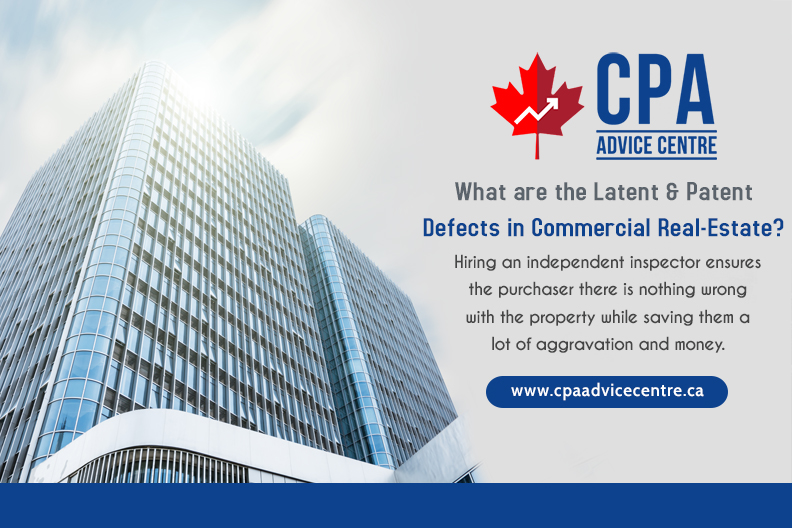THE IMPORTANCE OF AN INSPECTION WHEN PURCHASING PROPERTY
Unfortunately, the word of the seller may not be enough when purchasing property. Hiring an independent inspector will ensure the purchaser there is nothing wrong with the property while saving them a lot of aggravation and money. Nearly everyone believes one of the biggest decisions they will make in their life is purchasing a piece of property. Despite this, many individuals do not use a commercial inspector.

A commercial property inspector will make certain there are no faults in the property prior to the purchase reaching completion. The majority of properties do have a defect. The purchaser must be aware of the severity of the defect and how much improvement or maintenance will be necessary. Not every defect is easy to identify. There are two different types of defects, patent and latent.
PATENT DEFECTS
A patent defect can be seen easily. This type of defect will be detected during a visual inspection. Most of the patent defects are considered aesthetic issues. These defects are not hidden such as incorrectly installed trim around the windows and doors or a wall that has been primed but not painted. Aesthetic issues are easy to see and simple to fix without the function of the building being compromised.
LATENT DEFECTS
A Latent defect is hidden and often difficult to detect. This type of issue can be extremely serious such as improper framing preventing the wall from being strong enough to bear weight or too thin of a foundation. Latent defects also include the systems in the building. A good example is the vent fan in the bathroom. If this fan vents into an attic as opposed to out of the ceiling, the issue is major.
Even though it may take years to discover this issue, the result may be decay and rot in the attic. Once the issue in the building has been revealed, the purchaser can decide whether or not they want to proceed with the sale.
If the purchaser was aware of any latent defect prior to the completion of the purchase, legal action is no longer an option. Understanding the legal options for construction issues is imperative. This will enable the purchaser to know which steps they are able to take.
CAVEAT EMPTOR
Caveat Emptor is a common term in real estate. This is Latin for let the buyer beware. This term is extremely important for numerous reasons including:
1) When the purchaser is not aware of any serious defects, the purchase can result in costly issues.
2) It is the responsibility of the purchaser to perform due diligence to ensure there are no significant defects in the building or on the property.
3) All necessary inspections and inquiries must be performed prior to the purchaser signing the final paperwork.
When the purchaser takes all applicable steps prior to the purchase, the possibility still exists a serious defect can be discovered later. The first legal step regarding undisclosed defects is to determine if the issue is latent or patent. Any patent defect should have been obvious prior to the purchase such as a broken window. The purchaser is responsible for making their concerns known the moment the defect is discovered.
The seller can agree to repair the defects or decrease the price of the property. In most instances, the seller will attempt to bargain to receive as much for their property as possible. If the seller intentionally concealed the defect from the prospective purchaser, there are consequences. This includes:
1) The purchaser can take legal action for deceit due to fraudulent concealment.
2) When the seller does not reveal any defects, they are aware of, they are subject to a lawsuit and the ruling of the court.
3) Any individuals with real estate licenses such as an agent or a broker are legally required to inform the purchaser of any defect impacting the property value.
4) All deliberate misrepresentations concerning the property, or the building can result in legal action against the seller, agent or broker.
DETECTING DEFECTS PRIOR TO OCCUPYING THE BUILDING
All issues regarding defects should be worked out between the purchaser and the seller prior to the closing. This includes everything from water damage to termites. This is accomplished by the two agents working together to come to an equitable recourse of action acceptable by both parties. This includes:
1) Asking the seller for the parties responsible to pay for all necessary repairs.
2) Having the correct amount from the proceeds of the seller placed in an escrow account until the issues have been satisfactorily repaired.
3) The negotiation of credit from the closing amount. This means the purchaser will pay less than the seller during the closing.
4) Refusing to complete the closing until all repairs have been satisfactorily made.
Addressing Undetected Issues After the Sale:
When an issue regarding the commercial property was not disclosed to the purchaser by the inspector or the seller’s agent prior to the purchase, the necessary repairs will eventually be discovered. The purchaser must follow the correct steps to ensure the cost of the repairs is paid for by the seller as opposed to the purchaser. The steps are as follows.
1. The party responsible for the repair must be determined prior to the purchaser taking legal action through the courts. The responsible party can be:
The Seller: There are laws in Canada requiring the sellers of commercial real estate to inform the purchaser of building defects. The sale is generally completed after a standard disclosure form has been filled out. There are variations in the disclosure laws with some being more comprehensive than others. If a specific issue is not on the list, the seller may not be required to disclose the issue.
In most cases, the seller is not required to look for issues with the property. It may be obvious the seller knew about the issue but denied it. In this instance, the purchaser must try to determine when the seller became aware of the issue. If the occupants of the neighboring properties told the purchaser the seller made attempts to handle the issue in the past or the seller tried to conceal the issue, the evidence is on the side of the purchaser.
The Real Estate Agent for the Seller: In certain instances, the real estate agent is liable if they did not disclose the issue after being informed by the seller. Their obligations are fairly limited. The purchaser must perform due diligence to determine if the broker knew about the issue prior to the sale.
The best course of action is to consult with a commercial real estate attorney familiar with Canadian law. The lawyer can determine the obligation of the seller regarding disclosing the issue.
The Inspector: If the purchaser had a commercial inspection performed prior to purchasing the property, the issue should have been seen by the inspector regardless of whether or not the seller was aware. If the issue was missed by the inspector, they may be liable. The purchaser needs to look at the area with the issue on the inspection report and read what the inspector noted.
2. Determining if There is a Legal Case: Once the responsible party has been determined, the purchaser must know if the inaction or action of the seller entitles them to compensation. Despite the generalities of the legal principles, they are applicable in most cases. This includes:
If the defect in the building was not present prior to purchase but resulted due to a lack of maintenance or the natural aging of the building, the purchaser does not have a case. The problem is figuring out when the issue began. A good example is a blocked sewer line.
This may have been an issue for a long period of time due to the growth of roots into the pipe or the blockage may have been more recent. If the purchaser believes the issue began prior to purchase, there are options such as a professional assessment of the situation.
If the defect is obvious such as unlevel flooring due to a major crack in the foundation, the purchaser should have seen the issue. If they do not bring up the problem until after the closing, they have no recourse. If the seller took precautions to hide the issue, the purchaser may have a case. This may result in a claim against the inspector and the seller.
If the seller, their agent, the inspector or any combination of the three lied about the issue, the purchaser may be able to make a legal claim.
If the purchaser took the word of the seller that the building was up to code by relying on non disclosure or lies, they acted in reliance as opposed to performing due diligence. The only way to recover damages is if the seller did not fulfill their obligations.
The issue may have resulted in monetary damages such as the repair cost for related damages. This may be a decrease in the value of the property due to damage to the building or the contents. These are the legal damages that may be collected.
3. The Alternative to Court: Even if the purchaser has a valid claim against the seller, there are less stressful and cheaper options than taking the seller to court. The purchaser can send the party responsible a demand letter asking them to pay for the repair costs. The other option is meditation.
If the responsible party has been informed of the issue but does not agree to fix the problem immediately or offer compensation, the purchaser can ask the seller to go to mediation.
4. Filing a Lawsuit: If the purchaser has been unable to resolve the issue, they need to decide if they want to file a lawsuit. The responsible party can potentially be sued for any of the following:
Failure to disclose.
Breach of contract.
Negligence.
Fraud.
Breach of warranty.
Negligent misrepresentation.
There are specific steps for filing a lawsuit. The purchaser must be aware of the statutes of limitations or deadlines. The time allowed between when the issue was initially discovered and filing a lawsuit is limited.
Sarnail Singh, CCIM, MBA
Disclaimer: The information contained herein is intended for information purposes only. Although the information is believed to be correct, it’s accuracy, correctness or completeness cannot be guaranteed, and the writer make no representations or warrant the accuracy of the information provided. The prospective should not construe this information as legal. Legal counsel or other advisors should be consulted if desired on matters related to this blog and/or information. For more information please contact sarnail singh at info@sarnail.com.







